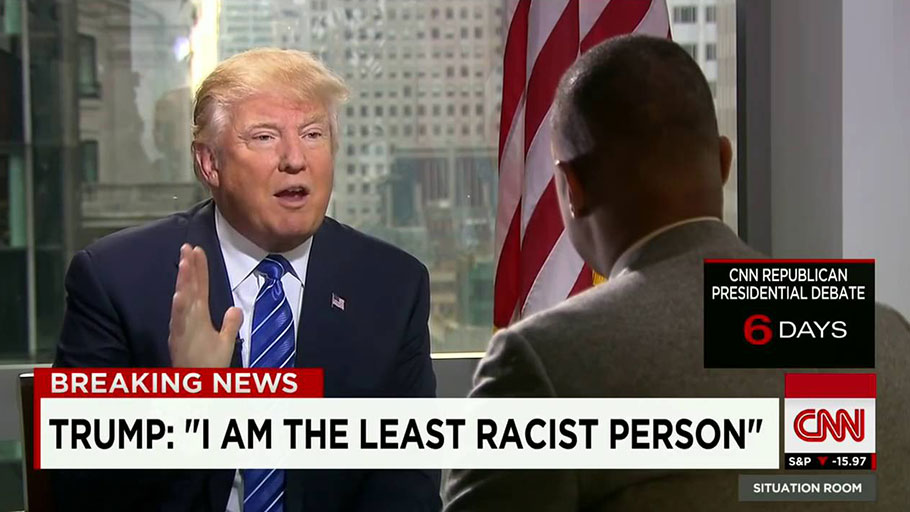The headline stories on the recent Associated Press-NORC Center for Public Affairs Research poll on Trump and racism were disturbingly misleading on a couple of counts. They blared that most Americans think that Trump is a racist. According to the poll, the percent who think that came in at 57 percent. That’s a clear majority. But that’s hardly “most” Americans. The even more misleading part is that there wasn’t much effort made to reverse the order and tell why a hefty number of Americans still can’t bring themselves to see any racist intent in any of Trump’s doings and pronouncements.
One would have to reach back to presidential candidate George Wallace in 1964, and maybe toss in GOP presidential candidate Barry Goldwater, to find someone who aspired to sit in the Oval Office who has so blatantly, nakedly and shamefully pandered to racial bigots to snatch the office as Trump did. His blatant, over the top birther assault on former President Obamas. His broadsides against Hispanics, Muslims, immigrants, blacks and women are almost the stuff of political legend. Trump punctuated this with his wink and nod tout of white nationalists after their Charlottesville, Virginia rampage last August.
He is the first president in living memory that has only one African-American in any significant cabinet and administration position with almost no prospects or indication that he wants to add to that total of one. His track record with Hispanics is not better, and deliberately so.
It’s not enough to chalk the racial blind spot, or just plain denial of the obvious about Trump’s grotesque racism to tone-deafness or apologetics. It’s also not enough to say that those who don’t regard him as a racist are racists themselves and simply see a little of themselves in Trump. Or, they find it too painful to admit that they and Trump are racial kin.
Never forget that tens of thousands of white, blue collar and rural male voters, in Wisconsin, Michigan, Ohio, and Pennsylvania voted for Obama, not once but twice in 2008 and 2012. Many of them made it clear that his race was not an issue. The issue for them was jobs, the economy, and staying on, or getting back, on their financial feet. Obama, not the white male GOP presidential candidates, was the best one to make that happen.
The political craft of Trump was that he paid attention to that sentiment and while he occasionally spruced things up with occasional racial code words and tough talk about minorities, it was back to jobs and the economy again that turned the tide for him, not direct, and overt racial pandering. In fact, after his virtual cheer of the white nationalists, polls showed that most whites weren’t having that. They did what he wouldn’t do, and that’s loudly condemn them. That included most GOP leaders.
It’s tough to get a handle on what is racism, and who can be called a racist because of the fuzzy, often misunderstood definition of what constitutes racism. It’s not just verbally or physically assaulting Blacks or Hispanics, racial baiting and name calling, or even the more nuanced denial of loans, and hiring and promotions to minorities. There’s plenty of that still, and plenty of whites that engage in those practices. However, the majority don’t and would be the first to denounce them. The same majority backed the campaign to get rid of Confederate monuments. But there’s little doubt that a good number of them also could be counted among the huge percent that don’t regard Trump as a racist.
The racial lines are so hopelessly muddled and blurred that a Trump can simply stick with issues that his loyal base and many other whites want to see and hear him talk and do something about and come off as racially inoffensive. This includes tax relief, affordable health care, job creation, and lambasting politicians for being politicians. This makes him in their eyes seem like a populist, and someone willing to take on the Beltway establishment. None of this is really true about him, but like anything else, perception supersedes reality. And Trump seems to grasp that.
There’s also the perception among many Americans that race conflict, strife and violence is largely a thing of an ugly, but by-gone past. The rash of civil rights laws, voting rights protections, packs of wealthy, prominent, high profile African-American CEOS, educators, pro athletes, and entertainers, and thousands of elected officials, give the comforting appearance that all is well on the racial front in America. So, it’s no surprise when periodic racial surveys find that a majority of whites don’t see race as the defining problem in America. And that other polls find that more than a few whites are willing to finger point Blacks, not whites, as the prime racial bigots in the country.
Trump gets a racial pass from millions for many reasons, and not just because they are racists like him. But it’s a dangerous pass, precisely because Trump has proven that he is perfectly capable of arch race-baiting when it suits him. It’s a pass that must be pulled.
Earl Ofari Hutchinson is an author and political analyst. His forthcoming book, 50 Years Later: Why the Murder of Dr. King Still Hurts (Middle Passage Press). He is a weekly co-host of the Al Sharpton Show on Radio One. He is the host of the weekly Hutchinson Report on KPFK 90.7 FM Los Angeles and the Pacifica Network.















